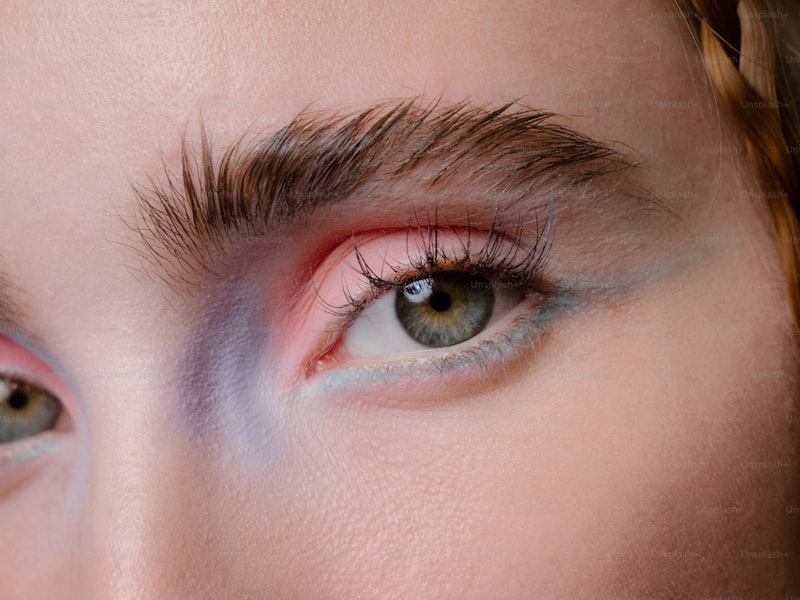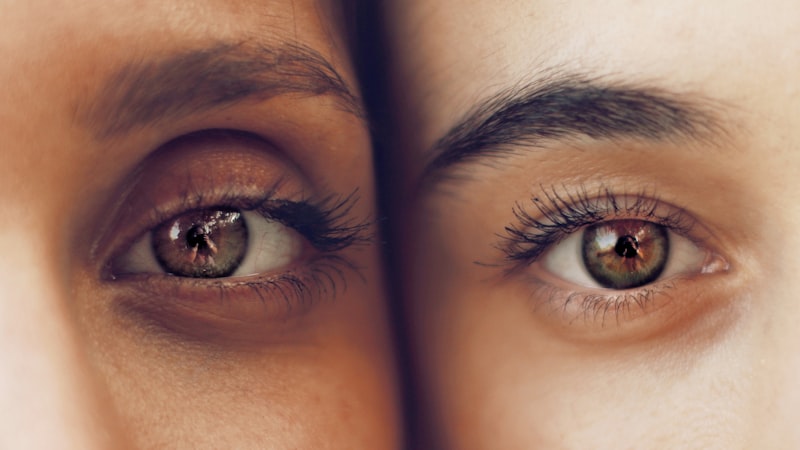Have you ever wondered what it takes to maintain clear, bright eyesight throughout your life? Our eyes play a crucial role in how we experience the world, so taking care of them is essential. Here are some practical tips to keep your eyes healthy and vibrant.
Firstly, maintaining a balanced diet rich in vitamins and minerals is key. Foods like carrots, spinach, and citrus fruits are packed with nutrients like vitamin A, C, and E, which are beneficial for eye health. These nutrients help protect against age-related vision problems like macular degeneration and cataracts.

Secondly, don’t underestimate the importance of regular eye exams. Even if you think your vision is fine, routine check-ups can detect early signs of eye conditions such as glaucoma or diabetic retinopathy. Early detection often means more effective treatment and better preservation of vision.
Another simple yet effective tip is to give your eyes a break from screens. In today’s digital age, we spend hours staring at computers, smartphones, and tablets. This can lead to eye strain, dryness, and headaches. Follow the 20-20-20 rule: every 20 minutes, look at something 20 feet away for at least 20 seconds. This helps reduce strain and keeps your eyes feeling refreshed.
Furthermore, protect your eyes from the sun’s harmful UV rays. Just as sunscreen protects your skin, sunglasses with UV protection shield your eyes from damage. Over time, UV exposure can contribute to cataracts and macular degeneration, so wearing sunglasses whenever you’re outside is a smart habit to adopt.
Lastly, quit smoking if you haven’t already. Smoking increases the risk of developing age-related eye diseases such as macular degeneration and cataracts. It also contributes to optic nerve damage, which can lead to vision loss.
By incorporating these simple tips into your daily routine, you can help maintain healthy eyesight for years to come. Remember, your eyes are precious, so treat them well!
Vision Wellness: Essential Tips for Maintaining Healthy Eyes
Taking care of your eyes is crucial for overall wellness. Your vision is one of your most precious senses, allowing you to experience the world in vivid detail. To maintain healthy eyesight throughout your life, adopting a few essential tips can make a significant difference.
Firstly, regular eye exams are fundamental. Just like routine check-ups with your doctor, comprehensive eye exams ensure any potential issues are caught early. Your optometrist can detect refractive errors like nearsightedness or farsightedness, as well as more serious conditions such as glaucoma or cataracts. Early detection often means easier treatment and better outcomes.
Another vital aspect of eye health is proper nutrition. Antioxidants such as vitamins C and E, zinc, and omega-3 fatty acids can help prevent age-related vision problems like macular degeneration. Including leafy greens, oily fish, citrus fruits, and nuts in your diet can provide these essential nutrients to support your eye health.

Protecting your eyes from the sun’s harmful UV rays is also crucial. Just as you protect your skin with sunscreen, wearing sunglasses that block UV rays helps shield your eyes from potential damage. Look for sunglasses that offer 100% UV protection and wear them even on cloudy days, as UV rays can penetrate clouds.
For those who spend extended periods in front of screens, taking regular breaks is essential. The 20-20-20 rule is a simple yet effective practice: every 20 minutes, look at something 20 feet away for at least 20 seconds. This reduces eye strain and fatigue associated with prolonged screen time.
Lastly, practicing good hygiene habits can prevent eye infections. Avoid touching your eyes with unwashed hands and always remove eye makeup before sleeping to prevent irritation or infections.

By incorporating these habits into your daily routine, you can help maintain optimal eye health and preserve your vision for years to come.
Your Eye Health Matters: Expert Tips for Clear Vision
Firstly, regular eye exams are fundamental. Visiting an optometrist or ophthalmologist regularly allows for early detection of any potential issues with your eyesight. This proactive approach can prevent vision problems from progressing and impacting your daily life.
Secondly, protect your eyes from harmful UV rays. Just as sunscreen protects your skin, sunglasses with UV protection shield your eyes from the sun’s damaging rays. This simple habit not only reduces the risk of eye diseases like cataracts but also prevents squinting and eye strain.
Next, maintain a balanced diet rich in nutrients beneficial for eye health. Foods high in antioxidants, vitamins C and E, and omega-3 fatty acids contribute to maintaining the health of your eyes. Incorporating leafy greens, colorful fruits, and fish into your diet supports overall eye health.
Additionally, give your eyes a break from digital screens. In today’s digital age, prolonged screen time can lead to digital eye strain. Follow the 20-20-20 rule: every 20 minutes, look at something 20 feet away for at least 20 seconds to reduce strain and refresh your eyes.
Furthermore, practice good hygiene to prevent eye infections. Wash your hands thoroughly before touching your eyes or handling contact lenses to minimize the risk of infections like conjunctivitis.
Lastly, prioritize sufficient sleep. Adequate rest allows your eyes to recover from daily strain and maintain optimal function. Lack of sleep can lead to dry eyes, irritation, and difficulty focusing.
By incorporating these expert tips into your lifestyle, you can proactively care for your eye health and maintain clear vision for years to come. Take small steps today to ensure your eyes remain healthy and your vision stays sharp.
Simple Steps to Protect Your Eyesight Every Day
Your eyes are priceless assets, guiding you through every moment of your day. To ensure they remain vibrant and healthy, incorporating simple daily habits can make a significant difference. Imagine safeguarding your eyesight effortlessly, starting with basic routines that fit seamlessly into your lifestyle.
Firstly, consider the power of good nutrition. Just as your body thrives on balanced meals, your eyes benefit from specific nutrients like vitamins C and E, omega-3 fatty acids, and zinc. These essentials can be found in a variety of foods such as leafy greens, fish, nuts, and citrus fruits. By nurturing your body, you’re also nurturing your eyes.
Next, embrace the 20-20-20 rule. In today’s digital age, we often find ourselves glued to screens for extended periods. This rule suggests taking a break every 20 minutes to focus on something 20 feet away for at least 20 seconds. It’s a small pause that can prevent eye strain and fatigue, ensuring your eyes stay fresh and focused.
Furthermore, don’t underestimate the importance of proper lighting and ergonomic setups. Whether you’re working at a desk or reading a book, adequate lighting reduces strain and maintains clarity. Position your screen or book slightly below eye level to minimize neck strain and optimize viewing comfort.
Lastly, protect your eyes from harmful UV rays. Sunglasses aren’t just a fashion statement; they shield your eyes from sun damage. Opt for sunglasses that block out 100% of UVA and UVB rays, even on cloudy days. This simple accessory can prevent conditions like cataracts and macular degeneration, preserving your vision for years to come.
By incorporating these straightforward practices into your daily routine, you’re taking proactive steps towards maintaining optimal eye health. Small adjustments today can yield significant benefits tomorrow, ensuring your eyes remain bright and clear throughout your lifetime.
Healthy Eyes, Happy Life: Practical Advice for Better Vision
Our eyes are our windows to the world, crucial for experiencing life’s beauty and navigating its challenges. Ensuring their health isn’t just about clear vision; it’s about preserving the quality of our daily experiences. Here’s some practical advice to keep your eyes in top shape.
Firstly, regular eye exams are fundamental. Think of them as maintenance checks for your vision. These exams not only detect any refractive errors like nearsightedness or farsightedness but also screen for more serious conditions such as glaucoma or cataracts. Catching these early can prevent irreversible damage.

Secondly, protect your eyes from harmful UV rays. Just as we shield our skin with sunscreen, sunglasses are crucial for eye protection. Look for shades that block both UVA and UVB rays to safeguard against conditions like cataracts and macular degeneration.
Maintaining a balanced diet also benefits your vision. Foods rich in antioxidants, vitamins A and C, and omega-3 fatty acids are particularly beneficial. Think leafy greens, colorful fruits, and fish. These nutrients support eye health and may reduce the risk of age-related vision problems.
Furthermore, practice good screen habits. In today’s digital age, prolonged screen time strains our eyes. Follow the 20-20-20 rule: every 20 minutes, look at something 20 feet away for at least 20 seconds. This simple habit helps prevent digital eye strain and keeps your vision comfortable.
Lastly, prioritize proper eye hygiene. Wash your hands regularly, especially before touching your eyes or handling contact lenses. Replace contact lenses as directed and avoid sleeping in them to prevent infections.
Eye Care 101: Easy Tips to Improve and Preserve Your Vision
Taking care of your eyes is crucial for maintaining good vision throughout your life. Whether you’re staring at screens all day or enjoying outdoor activities, here are some easy tips to keep your vision sharp.
Firstly, remember the 20-20-20 rule: every 20 minutes, take a 20-second break and look at something 20 feet away. This helps reduce eye strain caused by prolonged screen time, a common issue in today’s digital age.
Secondly, ensure proper lighting when reading or working. Insufficient lighting can strain your eyes and make it harder to see small print. Conversely, avoid harsh lighting that causes glare on your screen or page.
Moreover, don’t underestimate the power of a balanced diet. Foods rich in vitamins C and E, zinc, omega-3 fatty acids, and lutein can help ward off age-related vision problems like cataracts and macular degeneration. Think leafy greens, citrus fruits, nuts, and fish.

Additionally, protect your eyes from the sun’s harmful UV rays by wearing sunglasses that block 100% of UVA and UVB radiation. Prolonged exposure to UV light can increase your risk of developing cataracts and other eye conditions.
Furthermore, regular eye exams are essential, even if you think your vision is perfect. Eye exams can detect early signs of eye diseases like glaucoma and diabetic retinopathy, which often have no noticeable symptoms in their initial stages.
Lastly, give your eyes a break from contact lenses. Wearing them continuously can reduce oxygen supply to your corneas, leading to discomfort and potential eye infections. Consider wearing glasses on some days to allow your eyes to breathe freely.
By incorporating these simple habits into your daily routine, you can maintain optimal eye health and enjoy clear vision for years to come.
Frequently Asked Questions
Why is eye protection important in sunlight
Eye protection in sunlight is crucial to prevent UV radiation damage, which can lead to eye conditions like cataracts and macular degeneration. Sunglasses with UV protection help shield eyes from harmful rays and reduce the risk of long-term eye health issues.
What are the best foods for eye health
Discover the top foods that promote eye health with our concise guide. Learn about nutrient-rich options known to benefit vision and how to incorporate them into your diet for optimal eye care.
What are the symptoms of digital eye strain
Learn about the symptoms of digital eye strain, including eye discomfort, headaches, dry or irritated eyes, blurred vision, and neck or shoulder pain. Discover ways to alleviate these symptoms and prevent digital eye strain by adjusting screen settings, taking regular breaks, and using proper lighting.
How often should I have an eye exam
Learn how frequently you should schedule an eye exam to maintain optimal vision health. Discover the recommended intervals for different age groups and eye conditions, ensuring you stay proactive about your eye care.
How can I prevent eye infections
Learn effective ways to prevent eye infections with simple yet essential tips. Discover how hygiene practices, avoiding contact with irritants, and regular eye check-ups can safeguard your eye health.


